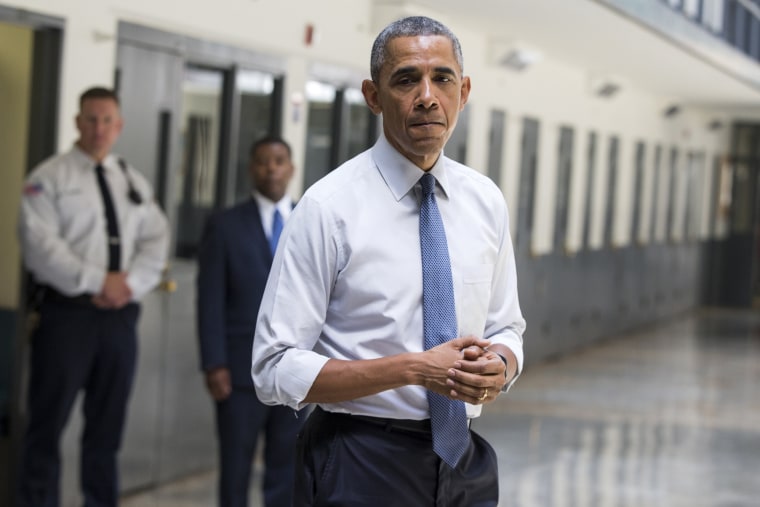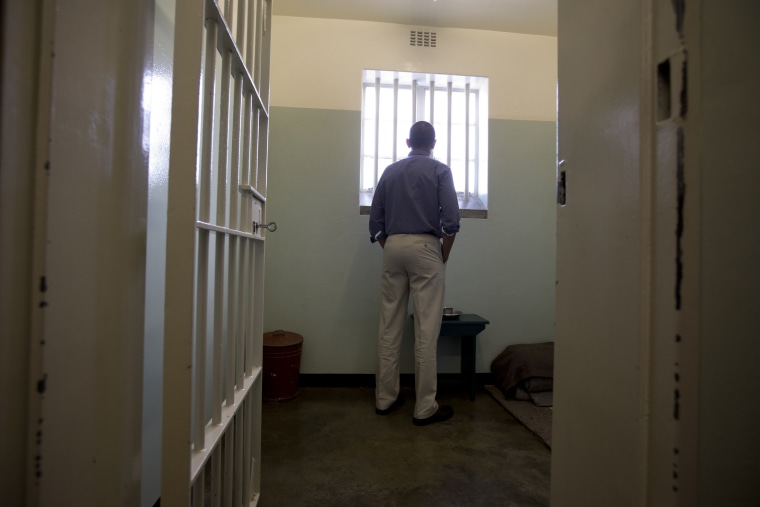Even before he announced the early release of 98 nonviolent federal prisoners on Thursday, President Obama had granted more commutations than any president in modern history.
The new total, 872 — more than the past 11 presidents combined — reflects his attempt, in his final years in office, to soften the impact of war-on-drugs era policies that resulted in epic prison sentences for nonviolent offenders.
{
"ecommerceEnabled": false
}Forty-two of those granted commutation Thursday were serving life sentences.

"These are individuals — many of whom made mistakes at a young age — who have diligently worked to rehabilitate themselves while incarcerated," White House spokesman Neil Eggleston said in a statement.
But as high as that number is, it is a small fraction of the nearly half-million people estimated to be incarcerated in federal, state and local jails on drug offenses today.
Related: The Spirals of Poverty and Mass Incarceration Upend Urban Communities
And it still leaves a long list of people hoping for a similar act of mercy from the president, who will leave office in January.
Federal prisoners applied in droves after Obama announced two years ago a push to free drug offenders who were sentenced to prison before the easing of notoriously harsh mandatory minimum laws in 2010.
The Obama administration worked with the nation's bar to recruit thousands of lawyers to screen the applications before they were submitted to the Office of Pardon Attorney in the Department of Justice, an effort called Clemency Project 2014. But bureaucratic obstacles contributed to a growing backlog.
Related: 30 Years after Basketball Star Len Bias' Death, Its Drug War Impact Endures
More than 11,000 applicants, most of whom likely do not meet the stringent criteria set by Obama for special consideration, are still waiting for word, according to Justice Department statistics.
The two candidates to succeed Obama, Hillary Clinton and Donald Trump, have not indicated whether they would continue his initiative.
That leaves the Obama administration with a lot of work do in the next thee months, if they plan to finish the job.
And it draws attention to larger disappointments for reformers — namely Congress' failure to pass a bill that would give judges more flexibility in sentencing drug offenders.
Related: As Drug Sentencing Debate Rages, 'Ridiculous' Sentences Persist
"The president is saying these sentences are too long and he's going to do what he can about changing them, but this isn't sentencing reform," said Mary Price, general counsel of Families Against Mandatory Minimums, which has helped recruit lawyers for the clemency initiative.
But that did not damper her enthusiasm on Thursday, which, she noted, was the 30th anniversary of the passage of the Anti Drug Abuse Act of 1986, the law that first imposed mandatory minimums on drug offenders.
"We need to repeal these laws, but having these commutations granted on this day is lovely," she said.
Inimai Chettiar, director of the Brennan Center's Justice Program at the New York School of Law, said her organization has suggested that Obama, or his successor, should take a more direct route by offering clemency immediately to the people who they knew already met their criteria.
"The criticism is they've been doing this through an overly bureaucratic process rather than making it more simple," Chettiar said.
That proposal would target 4,900 federal prisoners, a much more manageable number, she said.
Cynthia Roseberry, the project manager for Clemency Project 2014, said she hoped that Obama's successor would expand criteria to more people.
"It's important that the next president continues to grant clemency in this way," she said.

